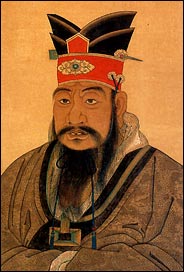 Confucius or 孔子 (Kǒng Zǐ) is China’s most famous philosopher, poet and scholar who lived from 551 BC – 479 BC, best known for his writings and musings on Chinese society and everyday life. His impact on Chinese culture has been so profound that some 2,500 years later his teachings are still well known and well respected.
Confucius or 孔子 (Kǒng Zǐ) is China’s most famous philosopher, poet and scholar who lived from 551 BC – 479 BC, best known for his writings and musings on Chinese society and everyday life. His impact on Chinese culture has been so profound that some 2,500 years later his teachings are still well known and well respected.
Like Socrates, Plato, Aristotle, and other Greek/Roman philosophers, Confucius spent his entire life trying to reconcile the social world with the natural world, looking for truths throughout that would improve society and the relationship between man and spirituality.
The philosophy of Confucius emphasized personal and governmental morality, correctness of social relationships, justice and sincerity. These values gained prominence in China over other doctrines, such as Legalism or 法家 (fǎ jiā) and Taoism or 道家 (Dào jiā) during the Han Dynasty (206 BC – AD 220). As a result, Confucius’ thoughts have been developed into a system of philosophy known as Confucianism or 儒家 (rú jiā).
The following is from the Confucian Analects, Chapters 1-5. Many of these chapters are on issues of morality and self-betterment. Heed these words, for they are timeless and great advice on how to live your life.
Chapter 1:
不患人之不己知,患不知人也。
“I am not bothered by the fact that I am unknown. I am bothered when I do not know others.”
主忠信。毋友不如己者。過,則勿憚改。
“Hold faithfulness and sincerity as first principles”. An English parable would be: “to thine own self be true”.
Chapter 2:
君子周而不比,小人比而不周。
The Superior Man is all-embracing and not partial. The inferior man is partial and not all-embracing.
Chapter 3:
人而不仁、如禮何。人而不仁、如樂何。
“If a man has no humaneness what can his propriety be like? If a man has no humaneness what can his happiness be like?”
Chapter 4:
見賢思齊焉;見不賢而內自省也。
“When we see men of worth, we should think of equaling them; when we see men of a contrary character, we should turn inwards and examine ourselves.”
君子欲訥於言而敏於行。
“The superior man is modest in his speech, but exceeds in his actions.” An English parable would be “actions speak louder than words”.
Chapter 5:
君子喻於義,小人喻於利。
“The superior man is aware of righteousness, the inferior man is aware of advantage.”






Leave a comment: